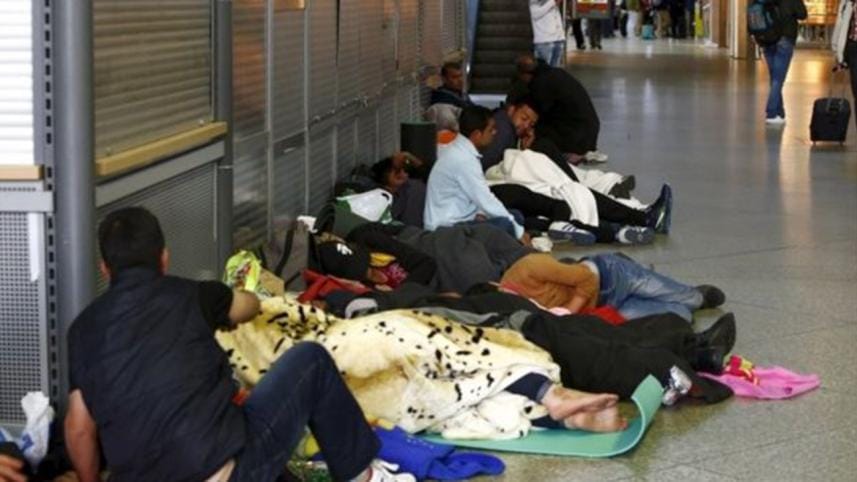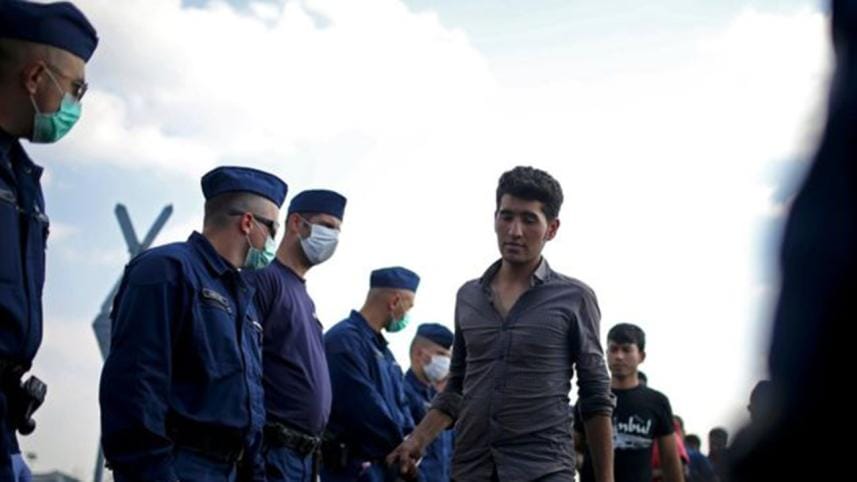Germany 'to start border controls'

Germany is to reintroduce some form of controls on its border with Austria to cope with the influx of migrants, German and Austrian media report.
It is not clear what measures would be introduced.
More than 13,000 migrants arrived into Munich alone on Saturday. Germany's vice-chancellor said the country was "at the limit of its capabilities".
Germany's Bild newspaper and Austria's Kronen Zeitung said controls would be in place on the Bavaria-Austria border.
Germany expects 800,000 migrants to arrive this year.
The German Interior Minister, Thomas de Maiziere, is expected to make an announcement in the coming hours.
Last month, de Maiziere said the Schengen agreement, which allows free movement between a large number of European countries, could be suspended.
Kronen Zeitung said that Bavarian police will begin to carry out checks "to determine immediately who is entitled to asylum", but it is not clear how such checks would be made.
Europe as a whole is struggling to deal with an enormous influx of people, mostly from Syria but also Afghanistan, Eritrea and other countries, fleeing violence and poverty.
As well as the 13,000 who arrived on Saturday, another 1,400 arrived in Munich on Sunday morning, police said.
"We lack 1,000 to 5,000 places," Munich Mayor Dieter Reiter told the Sueddeutsche Zeitung (in German).
The authorities are considering using a sports venue from the 1972 Olympics, the Olympiahalle, as a temporary shelter.
Earlier on Sunday, Germany's Vice-Chancellor Sigmar Gabriel, who is also economy minister, warned the country was being stretched to its limits by the new arrivals.
Last week, Gabriel said Germany could take in 500,000 asylum seekers a year for several years.
"Europe's inability to deal with the migrant crisis has brought even Germany to the limit of its capabilities," he told Der Tagesspiegel newspaper (in German).
"It is not just a question of the number of migrants, but also the speed at which they are arriving that makes the situation so difficult to handle."
Gabriel also called on European countries, Gulf states and the US to give billions of euros towards schools, accommodation and food in refugee camps in the Middle East.
"It just can't be right that hundreds of billions can be mobilised in a few weeks to rescue banks, but the international community cannot even provide a fraction of that when it comes to human beings," he said.
A steady stream of migrants is travelling from Greece, through Macedonia, Serbia and Hungary, to Austria and Germany.
Hungary is aiming to complete a four-metre-high (13ft) fence along the border with Serbia by 15 September, when tougher measures, including arresting illegal immigrants, come into force.
The European Commission announced plans last week for mandatory quotas to share out 120,000 additional asylum seekers among 25 member countries.

Hungary, the Czech Republic, Slovakia and Romania are opposed to this, with the Czech prime minister reiterating his country's position on Sunday.
What are the current border rules?
The European Union's Schengen zone, implemented in 1985, allows passport-free movement between member countries
26 European countries participate, but not the UK or the Irish Republic
Schengen signatories can re-impose border controls for short period for "public policy or national security" reasons after consulting "contracting parties".



 For all latest news, follow The Daily Star's Google News channel.
For all latest news, follow The Daily Star's Google News channel.
Comments